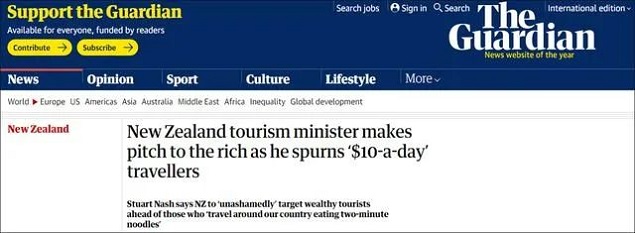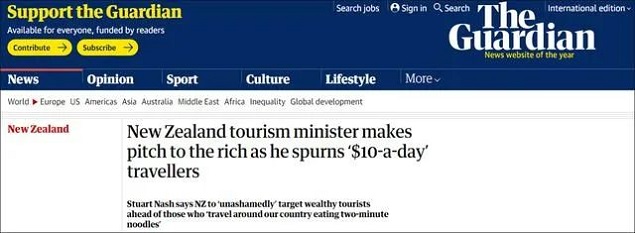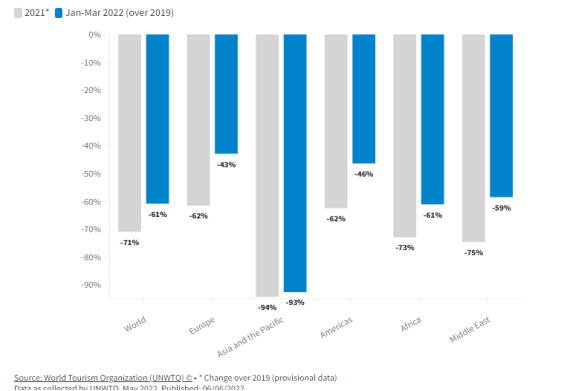新西蘭旅游部長:歡迎富人,拒絕窮游 NZ “unashamedly” target wealthy tourists
據英國《衛報》11日報道稱,新西蘭旅游部長近日再次表達了他對窮游游客的反感。他聲稱,新西蘭不希望吸引那些“每天只花10美元,吃著方便面游遍我們國家的游客”。
New Zealand’s tourism minister has again expressed his aversion to budget travellers, saying the country will not seek to attract those who “travel around our country on $10 a day eating two-minute noodles”.

斯圖爾特·納什表示,新西蘭會繼續專注有高消費能力的“高凈值”人群。盡管有專家指出,這類游客通常對環境帶來更多的影響,而且他們不一定會對新西蘭經濟做出更大貢獻。
Stuart Nash said the country would unashamedly continue to focus on “high quality” big spenders, despite one expert saying such visitors typically had a much higher environmental footprint and didn’t necessarily contribute more to the economy.
隨著新西蘭國境重新開放,納什在8月10日宣布將增加旅游業從業人員,并表示新西蘭會繼續招徠“大手筆”游客。他說:“我們的營銷策略會"公然"的面向高質量游客。”
At an announcement on last Wednesday about plans to bolster the tourism workforce as the country’s borders reopened, Nash said the country would continue to focus on “big spender” visitors. “In terms of targeting our marketing spin, it is unashamedly going to be at … high-quality tourists,” he said.
“我們也歡迎背包客,但我們不會將目標人群鎖定那些在臉書上分享如何每天只花10美元,吃著方便面游遍新西蘭的游客。”
"We are going to welcome backpackers … [but] we are not going to target the people who put on Facebook how they can travel around our country on $10 a day eating two-minute noodles.”
盡管這位部長在發言中仍對背包客和低預算游客表示歡迎,但他對富有游客的關注在過去一直存在爭議。
While the minister has said backpackers and lower-budget visitors were still welcome in New Zealand, his focus on rich tourists has been controversial in the past.
就在2020年,納什提到新西蘭將“公然”聚焦超級富豪,并將努力吸引那些“乘坐商務艙或豪華經濟艙、租用直升機在法蘭士·約瑟夫冰川觀光、然后在高檔餐廳用餐”的游客。這一提議隨即引發熱議,某評論員表示部長的言論“勢利、精英主義且脫離現實。”
In 2020, Nash said the country would “unashamedly” target the super wealthy, and seek to attract the kind of tourist who “flies business class or premium economy, hires a helicopter, does a tour round Franz Josef and then eats at a high-end restaurant”. The proposals attracted some heat, with one commentator calling them “snobby, elitist and out of touch.”
奧塔哥大學旅游系教授詹姆斯·希格姆表示,他還沒有看到任何研究證據能夠證明,“高凈值群體”對新西蘭旅游業的貢獻比低預算游客更多。
The assumption that “high net worth individuals” contributed more to New Zealand than budget travellers wasn’t necessarily backed up by the research, said Prof James Higham, a professor of tourism at Otago University. “I’ve seen no evidence for that,” he said.
他說:“近幾十年,全球旅游業的趨勢是游客走得更遠,更快到達目的地,產生更多二氧化碳,停留時間更短,在目的地消費更少。”
"The trend over recent decades globally has been for tourists to travel further, travel faster, produce more CO2, stay shorter and spend less at the destination,” he said.
這種趨勢往往導致“富豪們在破壞地球時并沒有像人們預期或希望的那樣為旅游目的地做出貢獻”。
The result, he said, was often “very wealthy people destroying the planet in the process of not contributing to destinations as we might have expected or hoped”.
“富豪游客通常對環境危害最大,而且因為他們往往……定期重復多次在目的地停留時間很短的高碳旅行……他們對新西蘭尤其是偏遠地區的旅游業并不會特別有利。”
"Big spenders are often the most environmentally damaging, and because they tend to have … regular repeat high carbon travel with low length of stay … they’re not particularly beneficial, particularly to far flung destinations made in New Zealand.”
而那些收入較低的游客,比如留學生和背包客,通常會在新西蘭停留更長時間,停留時間的長短與在新西蘭的累計消費額直接相關。
Tourists who tend to be on a lower income – such as international students and backpackers – often stayed for longer in the country, and length of stay was directly correlated with cumulative in-country spending, he said.
打個比方,游輪上的游客通常都很富裕,但這一占游客總數9%的人群的消費額,只占所有游客總消費額的3%。希格姆說:“與留學生相比,游輪乘客對經濟的貢獻低到令人沮喪。”
Cruise ship visitors, for example, were typically affluent, but made up only 3% of visitor spend, despite being 9% of visitors. “The economic contribution of cruise passengers is dismal compared to students who come here to study,” he said.
希格姆還說,窮游游客也經常是回頭客,那些以背包客身份來旅游的人未來可能會以勞動者或游客的身份回到新西蘭。
Budget travellers were also often repeat visitors – those who came as backpackers might return as workers, or as tourists later in life, Higham said.
納什發表上述言論之際,新西蘭正試圖重建其旅游產業及從業人員隊伍。此前,新西蘭因疫情的防控措施而與海外隔離了一年。
Nash’s comments come as New Zealand is attempting to rebuild its tourism workforce and industry after a year spent closed off from the world by pandemic protections.
在新冠疫情爆發之前,國際旅游業曾是新西蘭經濟的一個重要組成部分——其直接和間接貢獻占到了GDP總額的9.3%——但游客數量的增加也引發了越來越多人對環境惡化、過度擁擠和基礎設施壓力等問題的擔憂。
Before Covid-19, international tourism made up a huge chunk of the country’s economy – its direct and indirect contribution is 9.3% of GDP – but increasing visitor numbers had also prompted growing concerns about environmental degradation, overcrowding and pressure on infrastructure.
來源 | 衛報 The Guardian
譯文 | 中國日報網 China Daily
相關文章
權威話題
- 香港縮短入境隔離時間,推出“3+4”新方案 Hong Kong quarantine cut
- 7+3 China shortens centralized quarantine periods
- China streamlines procedures for international arrivals
- Camping Industry Is Expected to Boom
- WEEKLY HEADLINES 2022.6.18-6.24
- Recovery of tourism industry depends on market force
- WEEKLY HEADLINES 2022.6.25-7.1
 請掃描左側二維碼添加關注“旅業網”,或搜索微信公眾號“旅業網”,了解旅游行業動態及價值資訊。旅業傳媒,引領行業創新發展的媒體集群。
請掃描左側二維碼添加關注“旅業網”,或搜索微信公眾號“旅業網”,了解旅游行業動態及價值資訊。旅業傳媒,引領行業創新發展的媒體集群。 


 0
0

 2022-08-18
2022-08-18






